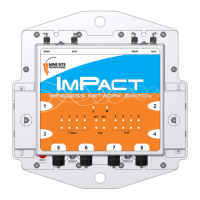NS50 wireless network switch
User Manual
Revision C
Appendix A: Trouble Shooting Guide
Appendix A: Troubleshooting Guide
This chapter assists in the diagnosis and resolution of problems with NS50 installation and operation.
The power light on
the NS50 blinks on
and off, and is dimly
lit.
Insufficient power supplied to
the NS50.
An additional DC power supply is required to boost
the power of the network switch. It is highly
recommended that a site survey is conducted to
determine power requirements during system
design or modifications.
PoE devices are not
operational.
Insufficient power supplied to
the NS50 to power PoE
devices.
Measure voltage to the NS50. If the voltage
measures less than 15VDC, a JB11 junction box is
required.
The PoE rail is not enabled.
Enable the PoE feature in the web browser
interface.
LEDs on the wireless
network switch are
not on.
Check that power is connected from either the
composite cable or the test / configuration jig to
the NS50.
Verify the network switch is connected to an
operational power supply.
Test the power supply is supplying the correct
voltage/current for the NS50.
Check there is sufficient power available if
extending the NS50 infrastructure.
The fibre activity
light is not on.
The NS50 fibre connector is
not connected.
Verify the fibre link is connected and active.
The wireless network
cannot be configured
from the web
browser interface.
There is a network access
issue.
Check that the NS50 is properly installed, LAN
connections are connected properly and the unit is
powered on. If the PC uses a fixed (static) IP
address, check that it is using an IP address within
the IP range of the network switch.
Check that the VLAN settings on the devices
upstream on the network are not restricting access.
Power supply
instability.
Incorrect earthing scheme.
Check antennas are insulated from ground.
Check PCB in the network switch has a floating
earth (not grounded).
There are too many network
devices on the one power
supply.
Add additional power supplies.
Isolate network segments so that in event of power
supply failure, an overload condition is avoided.

